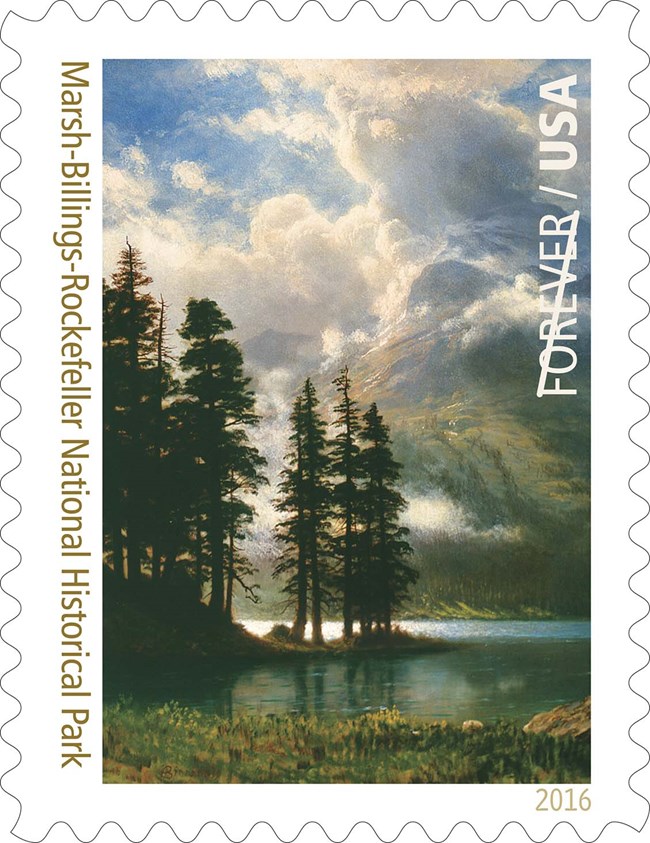
An iconic Hudson River School of Art landscape painting linked to the Conservation Movement that supported interest in creating the National Park system is the 12th of 16 Forever Stamp images to celebrate the National Park Service's 100th anniversary.The park and US Post Office held a dedication ceremony for the new stamp on June 4, 2016 at the park's Forest Center as part of Trek to Taste celebration. "This stamp exemplifies how our national park treasures extend beyond stunning vistas, wildlife, flora and fauna," said Stephanie Toothman, Associate Director, Cultural Resources, Partnerships, and Science, National Park Service. "Albert Bierstadt's painting represents the convergence of artistic, literary and political attention toward America's scenic beauty in the 19th century, which helped establish conservation as a national value and laid the foundation for the first national parks a century ago." The stamp image is a detail of Bierstadt's (1830–1902) 29-by-43-inch oil-on-canvas painting "Scenery in the Grand Tetons." The permanent home of the painting is Laurance Rockefeller's study in the Marsh-Billings-Rockefeller Mansion. Learn more about the painting here. The Conservation Movement and the Marsh-Billings-Rockefeller National Historical Park (NHP)The fine art collection at Marsh-Billings-Rockefeller National Historical Park is one of the gems of the National Park Service and includes 500 nature and landscape paintings, many by artists associated with the Hudson River School.The collection also includes folk art, modern art, portraits and sculpture. According to the National Park Service, Rockefeller acquired the painting in the 1960s and added it to the collection of the Marsh-Billings-Rockefeller Mansion as "a reminder of his family's long loyalty to Grand Teton National Park, and the preservation of the mountains, lake and valley in that spectacularly beautiful and dramatic part of the West." According to the National Park Service, "Their landscapes sought to recreate the majesty of the natural world and to inspire admiration for its beauty." Americans who bought their paintings and admired them on the walls of their city homes came to believe that those scenes should be preserved for future generations, not just painted or photographed. At the same time, the works of authors such as Nathaniel Hawthorne, Henry David Thoreau and RalphWaldo Emerson also celebrated the beauty and importance of nature. Marsh-Billings-Rockefeller National Historic Park The lives and contributions of these three generations of stewardship reflect the wide range of attitudes and ideas in the evolution of the conservation movement in the United States. The site was the boyhood home of G. P. Marsh, one of America's first conservationists, whose 1864 book, Man and Nature, decried the effects of deforestation in Vermont and around the world and provided the intellectual underpinnings of the early conservation movement. Later, it was the home of Billings, who returned to his native Vermont from California, transformed the property into a progressive farm and country estate, and reforested much of the land around the Mansion. Its most recent owners, Billings' granddaughter Mary Rockefeller and her husband Laurance Rockefeller, gave the property and its collections to the American people, the latest in a long history of support for National Parks by the Rockefeller family. Rockefeller received the Congressional Gold Medal in 1991 for his contributions to conservation and historic preservation. Other National Park Forever Stamps previewed to date include Acadia National Park, Arches National Park, Assateague Island National Seashore, Bandelier National Monument, Carlsbad Caverns National Park , Everglades National Park, Glacier Bay National Park and Preserve,Grand Canyon National Park,Gulf Islands National Seashore,Haleakalā National Park and Kenilworth Park & Aquatic Gardens. The June 2 first-day-of-issue ceremony for the National Parks Forever Stamps pane will take place at New York City's Javits Center at 11 a.m. as part of the world's largest stamp show that takes place only once every decade in the United States — World Stamp Show-NY2016. Dedication ceremonies will also take place at or near each of the National Parks depicted on the stamps. Individuals are asked to spread the news on social media by using the hashtags #NPSStamps, #FindYourPark or #NPS100. World Stamp Show-NY 2016 will take place May 28–June 4. This mega event is not to be missed by beginners through advanced stamp collectors. There will be something for everyone there, no matter what you collect. Stamp collecting is a hobby for a lifetime. No matter what your specialty, you'll find it at the show. The Postal Service receives no tax dollars for operating expenses and relies on the sale of postage, products and services to fund its operations. |
Last updated: February 14, 2017
